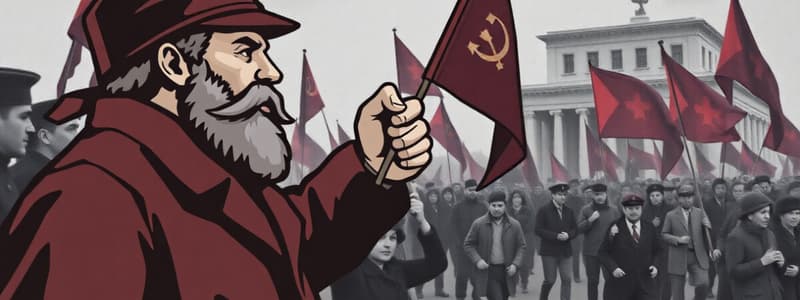Podcast
Questions and Answers
What is the primary focus of Marxism regarding societal structure?
What is the primary focus of Marxism regarding societal structure?
Which of the following best describes the concept of historical materialism in Marxism?
Which of the following best describes the concept of historical materialism in Marxism?
In Marxist theory, the term 'bourgeoisie' refers to:
In Marxist theory, the term 'bourgeoisie' refers to:
What does the Marxist concept of alienation primarily describe?
What does the Marxist concept of alienation primarily describe?
Signup and view all the answers
Which ideology opposes Marxism by emphasizing individualism and free market principles?
Which ideology opposes Marxism by emphasizing individualism and free market principles?
Signup and view all the answers
Flashcards
Marxism Key Concept
Marxism Key Concept
A set of social, economic, and political theories that analyzes class struggles and societal structures.
Class Struggle
Class Struggle
The conflict between different social classes, often over economic resources and power.
Historical Materialism
Historical Materialism
The belief that material conditions, particularly economic structures, shape societal development and history.
Alienation
Alienation
Signup and view all the flashcards
Capitalism Critique
Capitalism Critique
Signup and view all the flashcards
Study Notes
Historical Materialism
- This is the core concept in Marxist thought, arguing that material conditions, particularly the mode of production (how goods are produced), shape social structures, political institutions, and even ideas.
- It emphasizes that economic forces are the primary drivers of historical change.
- This contrasts with idealist philosophies that prioritize ideas and consciousness as the primary historical forces.
- The mode of production consists of the forces of production (technology, resources) and the relations of production (social and economic relationships of those involved in production).
- Changes in the forces of production inevitably lead to changes in the relations of production, thereby enacting historical change.
Class Struggle
- Marx argued that human history is fundamentally driven by conflict between different socioeconomic classes.
- The dominant class (e.g., the bourgeoisie) controls the means of production and exploits the subordinate class (e.g., the proletariat) for profit.
- This exploitation creates class consciousness—an awareness of one's shared class interests—among the oppressed.
- The struggle between classes is the engine of historical progress, inevitably leading to revolutionary change and the emergence of a new dominant class.
Surplus Value
- This concept explains how capitalist profit is generated.
- Capitalists extract surplus value by paying workers less than the value they produce.
- The difference between the value created by the worker and the wage they receive constitutes surplus value, which is appropriated by the capitalist.
- This exploitation inherent in capitalism is a fundamental source of tension between the working class and the capitalist class.
Alienation
- Marx observed that capitalism alienates workers from their labor, products of their labor, themselves, and each other.
- Workers are alienated from their labor because they do not control the process of production or the product they create.
- They are alienated from the products because the products are owned by the capitalist, not the worker.
- Workers are alienated from each other because competition and the drive for profit foster a sense of isolation and antagonism.
Ideology
- Marx saw ideology as a system of ideas that justifies and maintains the power of the dominant class.
- Ideologies often mask the underlying economic inequalities and exploitation inherent in a particular social order.
- They serve to legitimize the existing power structure and obscure the conflict between classes.
- The ruling class controls the means of communication and education, shaping public opinion in ways that maintain its dominance.
Historical Stages of Society
- Marx posited that history progresses through various stages of economic development: primitive communism, ancient society, feudalism, capitalism, and eventually communism. Each stage is marked by different modes of production and class relations.
- Each stage contains inherent contradictions that lead to its eventual replacement by a more advanced stage.
Communism
- Marx envisioned communism as a future classless society where the means of production are owned communally, eliminating exploitation and alienation.
- Private property is abolished in favor of collective ownership, leading to a more equitable distribution of resources.
- It envisions a society with no classes and no need for a state apparatus.
Critique of Capitalism
- Marx critically assessed capitalism, identifying key shortcomings like inherent contradictions, cyclical crises, and relentless exploitation of the working class.
- He argued that the pursuit of profit and competition inevitably lead to instability.
- Capitalism's inherent drive to accumulate more capital creates internal conflicts and pressures, constantly driving the system toward crisis.
Studying That Suits You
Use AI to generate personalized quizzes and flashcards to suit your learning preferences.
Description
Explore the fundamental principles of Marxist thought through this quiz on Historical Materialism and Class Struggle. Understand how material conditions and economic forces shape society and influence historical changes. Test your knowledge on the dynamics between different socioeconomic classes and their impact on history.




